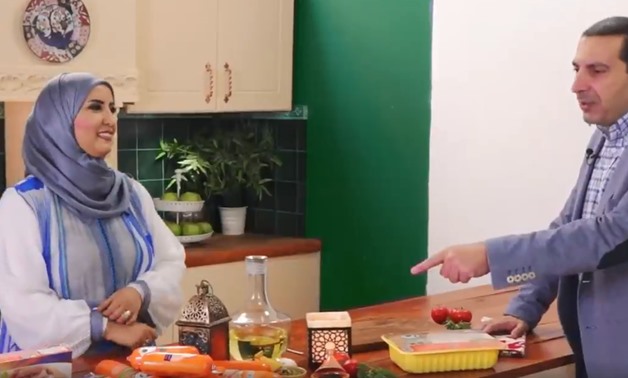
Well-known Egyptian preacher Amr Khaled is in hot water because of an advertisement video posted on Facebook featuring him calling to eat Alwatania brand chicken to perform better in prayers - Courtesy to Facebook page of Alwatania
CAIRO – 19 May 2018: Well-known Egyptian preacher Amr Khaled is in hot water because of an advertisement video posted on Facebook featuring him calling to eat Alwatania brand chicken to perform better in prayers.
Khaled became the laughing stock of social media after he linked between eating this chicken and piety in prayers. He stressed that the brand of chicken will help Muslims be in good health and thus maintain their piety through the prayers.
A video posted on the Facebook page of the poultry company has provoked a wave of protest and criticism over the credibility of the preacher. Dozens of jokes have been posted on Facebook about the poor advertisement and the fake performance of Khaled. With the attack on Khaled, the company was forced to delete the video from its Facebook page.
Earlier, Khaled was shown in video performing Hajj (pilgrimage) rituals in Mecca, Saudi Arabia. The video, which went viral, showed Khaled praying for his followers on social media, a matter which raised a lot of questions and mocking, as many people saw the Egyptian preacher as only seeking to obtain more followers and “likes”.
Khaled was criticized and accused of acting and using the religion for personal gain by some social media users.
Who is Amr Khaled?
Khaled has been preaching since 1997, according to statements made in the video he posted on his official Facebook page in response to the criticism he took earlier.
In the early 2000s, Khaled’s religious effect as an Islamic preacher was overwhelming on Egyptians. He almost convinced a number of actresses to retire and wear headscarves. He made several television shows presented by many youth, women and men from all social levels, as he affected them all.
His TV show “Sonaa Alhayat” (Life Makers) morphed into a social association per invitation during one of his episodes, where he said that serving society and working on its development is part of someone’s religion.
Later, in 2014, he was excluded from the association’s high board. In statements to BBC, the board’s head, Mohamed Yehia, said that excluding Khaled was not for personal reasons, but due to “the nature of the stage the society is going through.”
As time went by, Khaled’s effect didn’t remain the same, especially after the January 25 Revolution.
During this time, Khaled’s political affiliations were questioned within an environment where every political move was monitored. He called for a political party named “Masr el Mostakbal” (Egypt the Future) on May 2012, which increased the controversial opinions surrounding him amid voices refusing the mixing of religion and politics.
Despite all this, Khaled didn’t stop, repeating at every chance that he is “a man with a message” that will continue regardless of the circumstances. Khaled still participates in several social campaigns and posts regularly on his social media outlets as a religious preacher.
Khaled now has about 29 million followers on Facebook, 11 million on Twitter and 587,000 subscribers on his YouTube channel.
Additional reporting by Aya Samir


Comments
Leave a Comment